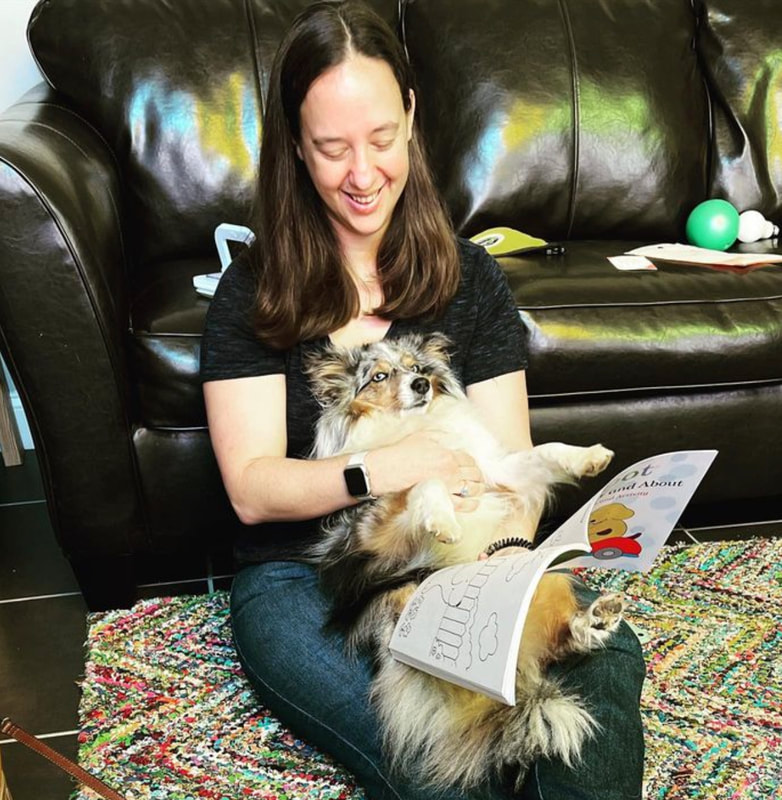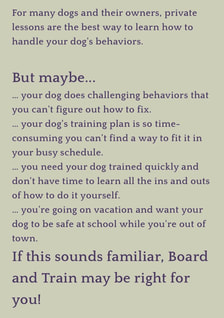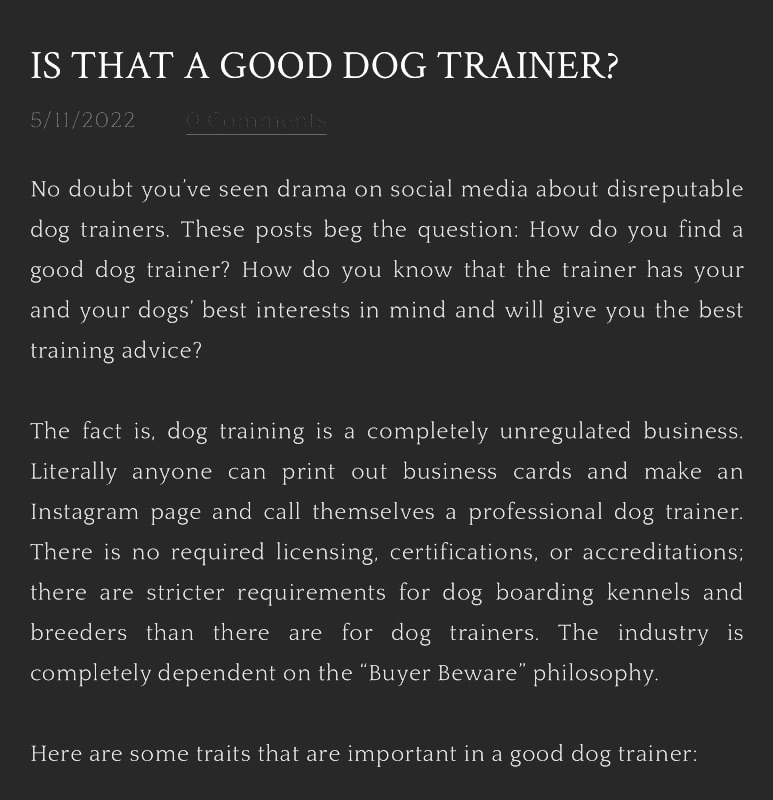But for a lot of dog owners, it’s difficult to think about your dog being away from you for any period of time. Board and Train is definitely worth it for certain dogs, to improve their quality of life and the quality of their families’ lives; but is it right for YOUR dog? Training Goals Board and Train programs work best with teaching dogs TO DO behaviors: sit when I say “sit,” lay down when I say “down,” etc. So think about what behaviors you want your dog to do. Do you want your pet dog to learn obedience cues? Board and Train can help with that that. Do you want your service dog prospect to learn tasks like retrieving dropped items? Board and Train is great for that, too. Do you want your dog to stop jumping on the counters? This is a DON’T DO behavior, and these *don’t* work well in Board and Train. Stop pottying in the house? Stop barking at the neighbor dogs in the backyard? Stop jumping on guests? These are all DON’T DO behaviors. A good trainer would easily prevent these behaviors from happening during the Board and Train period, but that doesn’t mean your dog won’t go right back to doing them again when he comes back home. The best option for these behaviors is to do lessons with a trainer to learn how to prevent them from happening at your house, too.
If, however, your dog does not like other dogs or new people, dropping him off at a facility full of dogs and strangers will cause him to be very stressed; stressed dogs have a hard time learning. You can mitigate this stress by making sure that the facility holds a very small number of other dogs, with a very small number of human staff as well, but ultimately if it takes your dog several days to feel comfortable in that place, that’s several days of training time you’ve lost. Board and Train is an especially bad idea for dogs with separation anxiety; dogs who cannot be left home alone. Dogs with separation anxiety are insecure about their owners leaving, so dropping them off at Board and Train will just add to that insecurity. Moreover, all Board and Train facilities will have to eventually put your dog in a crate or kennel while the trainer(s) leaves, so your dog will need to be comfortable with confinement before Board and Train. Your continuing education Dogs don’t generalize well. Just because he learns “sit” at the Board and Train facility, doesn’t mean he will automatically do “sit” when you take him back home. You need to learn how he was trained to do the behaviors so that you will understand how to get him to do the behaviors for you. Follow up lessons with the trainer will be very important too, so make sure those are included in the Board and Train. Even after the lessons are over, you will still need to continue training with your dog to help him remember the skills. Board and Train teaches dogs behaviors, but it will still be up to you to maintain those behaviors.
Puppies aren’t for everyone, so if you can’t care for a puppy, consider paying the breeder to keep the puppy with his dog family for a few extra weeks or months until you’re ready for him. Or, consider getting an adult dog instead of a young puppy. First/Last Resort
Board and Train can be an excellent option for owners who don’t have the time to learn HOW to train behaviors, and simply want their dog to know them. I personally have spent hours on seemingly simple behaviors, like “lay down,” because sometimes dogs just have a hard time understanding. The best part of Board and Train is that your trainer can take the time necessary to teach these behaviors, fast tracking the training for you. Many dog owners go into a Board and Train program with the idea that if it doesn’t “fix” their dog, then it’s time to rehome the dog. But Board and Train will not change your dog’s personality, his exercise needs, his likes and dislikes, etc., AND you will still need to keep up training to maintain the skills he’s learned. It would be a good idea to seriously analyze exactly why you don’t want to keep your dog, before deciding whether or not Board and Train will make you change your mind. Still not sure if Board and Train is a good option for you and your dog? Contact me with any questions and we’ll figure it out!
7 Comments
9/1/2022 05:03:26 am
anks for sharing the article, and more importantly, your personal experience mindfully using our emotions as data about our inner state and knowing when it’s better to de-escalate by taking a time out are great tools. Appreciate you reading and sharing your story since I can certainly relate and I think others can to
Reply
1/18/2023 11:47:47 pm
Yeah, sometimes a "boot camp" is the best option for a dog who needs more training than the average pet. It's a much better option than giving up on the dog entirely. We also get a lot of questions about our board and train services, and some dog owners are hesitant about the idea. Anyway, good luck with your dog training business there!
Reply
6/22/2023 11:23:45 pm
After reading this insightful blog post, I realized that Board and Train programs can be a lifesaver for teaching your dog essential behaviors, especially for my mischievous pup who loves to jump on strangers. However, the cautionary note about don't-do behaviors made me reconsider, as I want my dog to learn how to stop pottying in the house, and it seems that one-on-one lessons with a trainer might be a better fit for addressing those specific issues.
Reply
8/16/2023 05:14:12 am
Thank you for sharing! Been wondering how these programs worked. Very helpful.
Reply
10/10/2023 08:10:26 pm
Your post brings back memories of when I enrolled my dog, Sammy, in a Board and Train program. I was hesitant at first, fearing the separation, but seeing the remarkable progress in his behavior was truly worth it. However, I can't stress enough how crucial it was to keep practicing with him at home to maintain those learned behaviors.
Reply
This blog post is an eye-opener for dog owners like me who have considered Board and Train programs for their furry companions. Reading through the training goals, especially the distinction between "TO DO" and "DON'T DO" behaviors, struck a chord. I once thought such programs would magically transform my dog, but the insight here on the importance of ongoing training and the role of the owner is a reality check. The emphasis on the dog's temperament and the qualifications of the trainer make me more cautious about choosing such a program. Thanks for shedding light on this important decision-making process!
Reply
2/17/2024 09:35:35 am
The post raises some crucial points about Board and Train programs. As a dog owner, I empathize with the dilemma of wanting a well-behaved pet but grappling with the idea of separation. The caution about the trainer's methods and the reminder of the owner's responsibility to continue training post-Board and Train are insightful, shedding light on the nuanced nature of dog behavior and training. Kudos to the author for addressing these complexities and offering guidance to those navigating this decision.
Reply
Leave a Reply. |
AuthorElizabeth Morgan specializes in training service dogs as the trainer and owner of Alabama Dog Academy. Archives
January 2024
Categories |
|
256-434-1747 (call or text)
[email protected] |
Proudly powered by Weebly






 RSS Feed
RSS Feed


